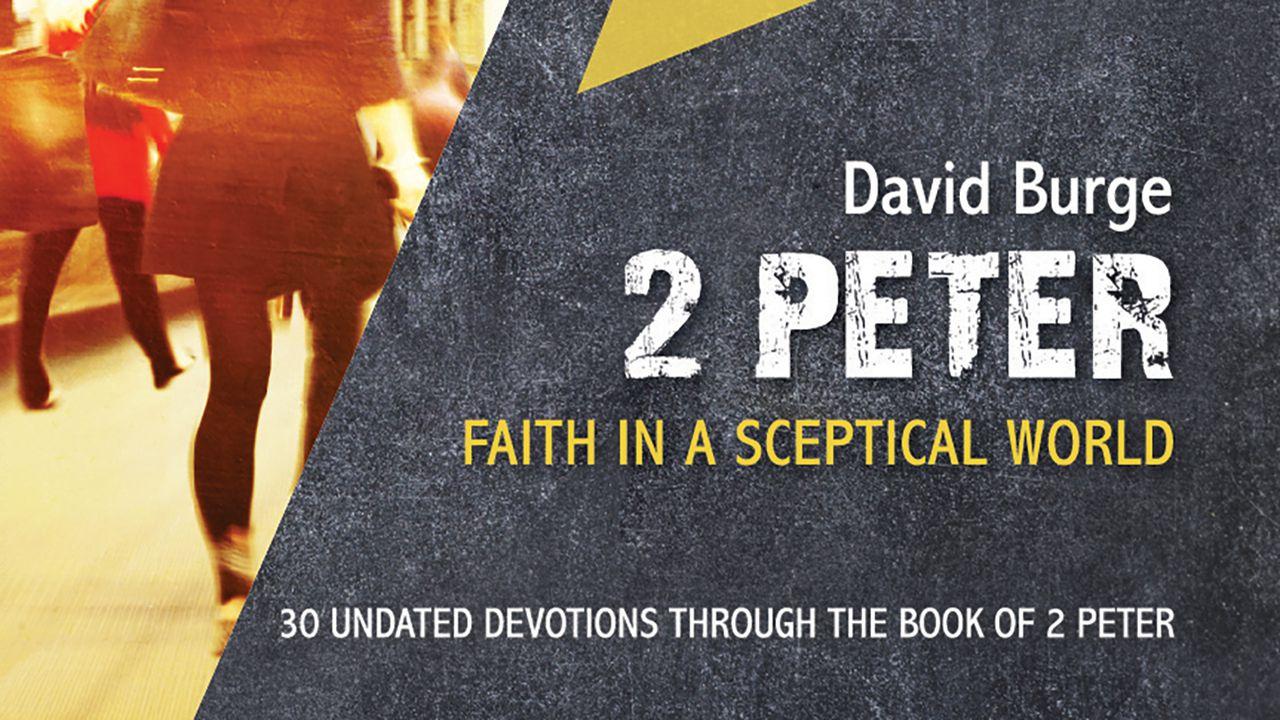2 Peter: Faith In A Skeptical World Exemplo

In Australia, those who survive close encounters with intense bushfires have those fires impressed upon their minds for the rest of their lives on earth. The chaotic, dreadful moments that roll into hours or days bring shivers down their spines and tears to their eyes. For the survivors, the fire is in their past, but continues to affect them in the present.
For Christians, the fire of all fires is scripted into the future. Peter graphically describes what it will be like, presumably so that we will meditate on it, and allow its fierce heat and destructive power to cause shivers down our spines and tears to our eyes. He tells us to keep our eyes on that fire, to ‘look forward’ (v. 12, NIV) towards it or be ‘waiting for’ (v. 12, ESV) it, as well as to the renewed earth that will follow it (v. 13).
How will it affect us if we have this terrifying fire and renewed earth on our mental horizon each day? Are we to be traumatised by it, or filled with dread as we brace ourselves as those waiting from a bunker for the fire to pass over? Peter asks that very question: ‘Since everything will be destroyed in this way, what kind of people ought you to be?’ (v. 11).
Throughout Scripture, the fear of God causes many to run from God, but a healthy fear of God leads us to run to Him. We cry, ‘Wash me Saviour, or I die!’ In light of Christ’s coming, we honour Him and draw near to Him for refuge. Peter’s exhortation for holiness and godliness expresses this God-ward movement (v. 11).
Holiness is a dominant theme in 1 Peter. Christians are God’s holy nation, bought by Christ’s precious blood, set apart by Him, for Him, to resemble Him, please Him and even represent Him. Our loyalties are clear. We know whose we are, and it shapes all we do. Our minds, hearts, attitudes, wills, ambitions, speech, schedules, hobbies and deepest longings are dedicated to God. Holy people are thoroughly, absolutely His. In verse 11 Peter also reiterates (see 2 Pet. 1:5–7 and 2:9) the importance of godliness, which overlaps in meaning with holiness (see 1:6).
What does Peter mean by us ‘hastening’ (v. 12, ESV) or seeking to ‘speed’ (v. 12, NIV) the coming of the day of God? It could be referring to the change that takes place when we cease complaining that God is slow or delayed, and see each day as a gift of God’s patience for us to urgently go about His kingdom work (v. 9). Time seems to pass quickly when there is much work and limited time. It could also be referring to Jesus’ words: ‘And this gospel of the kingdom will be preached in the whole world as a testimony to all nations, and then the end will come’ (Matt. 24:14). Either interpretation urges us to actively serve the Master with godliness and holiness until He comes.
Reflection
Godliness, holiness, anticipating the end, and speeding its coming: how are you pursuing each of these? Which could you give your mind to, and what implications might follow?
Escritura
Sobre este plano

Your faith is precious! So often, though, we can feel weak, irrelevant and marginalized. Living in a skeptical world where truth is twisted and false teaching abounds isn’t easy. Peter knew about the challenges of living in such a world, but he also knew Jesus deeply, and he was utterly convinced of the importance of trusting Jesus and living for Him. Bible teacher David Burge delves into this letter and highlights relevant applications for our lives today. Be reminded of the truth about Jesus, motivated to continue to trust him and equipped for living in a skeptical world with these thirty undated devotions.
More
Planos Relacionados

The Gratitude Muscle! A 5 Day Challenge

Jesus Is King: A Study on the Kingdom

Praying for Your Future Husband: Trusting God With Your Heart

When One Person Says ‘Yes’ to God

God’s Kind of Christmas

Confidence in Christ

The Power of the Gospel

Sabbath in the Psalms
